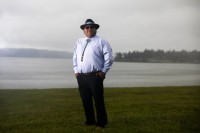Nez Perce Tribe Chairman Shannon Wheeler, a visionary leader fighting to restore the Snake River and abundant salmon and steelhead.
A Conversation with Nez Perce Tribe Chairman Shannon Wheeler
Listen or read now
The conversation
Earlier this summer I had the opportunity to speak with Nez Perce Tribe Chairman Shannon Wheeler, a visionary leader fighting to restore the Snake River and abundant salmon and steelhead. Chairman Wheeler's experience in the private sector, and as Tribal member exercising Treaty-reserved rights, forms the foundation of the policies he advocates for. This interview has been edited for length and clarity.

Q: What does it mean to be salmon people?
In our creation story, we have an obligation to the salmon. The salmon and the other animals had a meeting before there were people, when they could all talk, and salmon was the first to give himself up. He said, “I will lose my voice to give myself to you.” This story has been passed on for countless generations and this obligation is deeply rooted. It is a covenant between humans and the environment. We can’t strip away our word that we gave to the salmon. We have always given prayers for the foods to come back each year but we never thought that they would face extinction. In 1974 the last dam went up on the Snake River, and the runs were decimated in under 50 years. This is why we fight.
As salmon people, we don’t see ourselves any different from the land itself and our foods, and we never place ourselves above our foods. From a cultural perspective, we are the same as the salmon, therefore we are salmon people.
Q: What would Lower Snake River dam removal mean for the Nez Perce people and what are you doing to lead the effort for removal?
The Lower Snake River dams need to be breached in order to recover the Endangered Species Act-listed species of salmon, or nacó’x̣ as we call them. They are teetering on the brink of extinction right now, and we know since the inception of the dams in the Lower Snake River, these runs have declined and continue to decline. Once the final dam was built, we saw the dramatic reduction of fish that were returning to us, predominantly the spring salmon that are the most prized of all because of the nutrients that they provide.
We are currently in negotiations with the U.S. government through the Federal Mediation Conciliation Service process. We are working with state & federal legislators and governors that are willing to sit and talk and have honest conversations with us, and we are also talking to other stakeholders. We are looking for solutions for salmon recovery and solutions for the Pacific Northwest to continue to grow and prosper into the future—a future that includes renewable energy, and updated transportation and irrigation systems.
Q: You are executive producer of the new film, “Covenant of the Salmon People.” Why did you make this film and what do you hope to accomplish with it?
The film is our story about our relationship to the land itself and what we call Mother Earth, to the salmon in our creation story, how we are related, and what that obligation means to us. The telling of that relationship is important because that is the relationship that the U.S. signed up for in 1855 under Article 3 of our Treaty, that is our right to hunt, fish, and gather at all usual and accustomed places. In 1859 that Treaty was ratified by Congress and enshrined in the U.S. Constitution under Article VI, Clause II, which is an obligation by the U.S. government to uphold their end of the bargain. We have upheld our end of the bargain since 1855. This film is a way to tell our story to the general population so they have a better understanding of who we are and our attempts to uphold our obligation to the salmon and to the land itself.
Q: What can non-Tribal people do to stand in solidarity with the Nez Perce?
People can help by honoring the treaties and understanding that the people of the U.S. are also party to the Treaty because they are represented by the U.S. government which signed the Treaty. As citizens of the United States, ask your legislators: what is the U.S. doing to uphold the treaties with the Tribes?
People can also support our “Covenant of the Salmon People” film, the Salmon Orca Project, Umatilla youth sign on letter to Biden, and keep sending letters to the administration and elected leaders.
Q: What gives you hope?
The truth always gives us hope, and we continue to speak the truth. Change is constant, and we as people can and are learning from our mistakes. It really gives us hope that people are starting to see that we can and should change how we do business, and how we affect the environment to achieve more positive outcomes for future generations.
Visit covenantofthesalmonpeople.com to find out about upcoming showings.
Salmon Unite Us: Join the Fight for Recovery
Want to hear all the stories from Columbia Riverkeeper's Currents Issue 2, 2023 Newsletter?
Tell Northwest leaders and Pres. Biden to remove Snake River dams, prevent salmon extinction, and honor Tribal rights.


